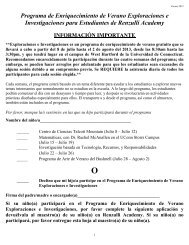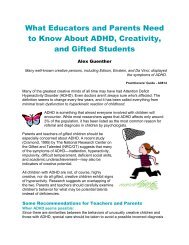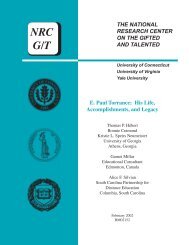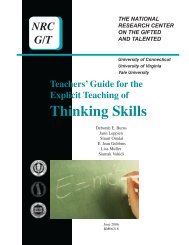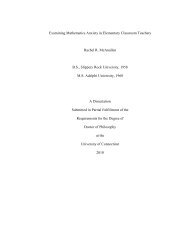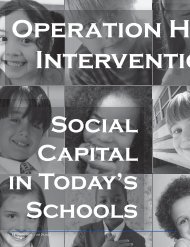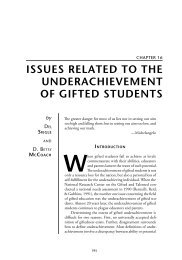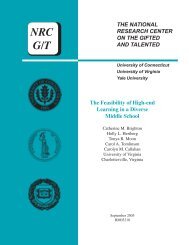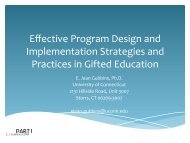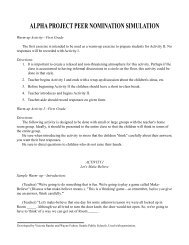Giftedness and High School Dropouts - Neag Center for Gifted ...
Giftedness and High School Dropouts - Neag Center for Gifted ...
Giftedness and High School Dropouts - Neag Center for Gifted ...
You also want an ePaper? Increase the reach of your titles
YUMPU automatically turns print PDFs into web optimized ePapers that Google loves.
they left school because they didn't like school, they were pregnant, they became a<br />
parent, <strong>and</strong> they were failing school. In both groups, school-related reasons such as "I<br />
did not like school" <strong>and</strong> "I am failing school" were important reasons <strong>for</strong> leaving school.<br />
An examination of the parents' reactions to their children's dropout behavior<br />
revealed that many parents (75%) tried to talk them into staying in school. Interestingly,<br />
64.4% of respondents reported that parents said that it was their children's own decision,<br />
while 69.3% of respondents said that their parents were upset. Results indicated that only<br />
a small percentage of parents offered outside counseling (9.5%), called a school<br />
counselor (22.8%), or called the child's teachers (26.1%).<br />
A majority of gifted students who dropped out of school (73.8%) responded that<br />
they never or rarely used a computer, not including playing video/computer games, <strong>and</strong><br />
only 5.9% of them responded that they used a computer every day. Also, 37% of gifted<br />
dropouts responded that they never or rarely spent their time on hobbies. A large<br />
majority of dropouts (83%) responded that they never or rarely spent time volunteering.<br />
Only 17% of dropouts participated in volunteer work.<br />
The amount of time that gifted students who dropped out of school spent with<br />
friends <strong>and</strong> parents was examined. While 51% responded that they spent time talking<br />
with friends every day, 31% spent time talking with their parents every day, <strong>and</strong> 40% of<br />
dropouts responded that they talk with parents less than once a week or never.<br />
In response to the type of job that they would have at age 30, 11.7% wanted to be<br />
in the professional I category (accountant, nurse, engineer, banker, librarian, writer,<br />
social worker, artist, athlete, actor, <strong>and</strong> politician); 10.5% wanted to be a service worker<br />
(e.g., hair stylist, practical nurse, child care worker, waiter, domestic, <strong>and</strong> janitor); 9.3%<br />
wanted to be an office worker (e.g., data entry clerk, bank teller, bookkeeper, secretary,<br />
word processor, mail carrier, <strong>and</strong> ticket agent); <strong>and</strong> 9% wanted to be an owner of a small<br />
business or restaurant, or a contractor.<br />
Research Question 2: Is there any difference between gifted dropouts <strong>and</strong><br />
non-gifted dropouts with respect to their plans to return to school<br />
A chi-square analysis was conducted to examine differences between gifted<br />
students <strong>and</strong> non-gifted students who dropped out of school, with respect to their plans to<br />
return to school. Results indicated that there was no significant difference between the<br />
two groups with respect to their plans to return to school. Only 35.9% of gifted students<br />
planned to return to school, while 64.2% had no plans to return to school. Similarly, 34%<br />
of non-gifted students planned to return to school, while 65.1% had no plans to return to<br />
school.<br />
Research Question 3: Is there any difference between gifted dropouts <strong>and</strong><br />
non-gifted dropouts with respect to their self-concept <strong>and</strong> locus of control<br />
xi




